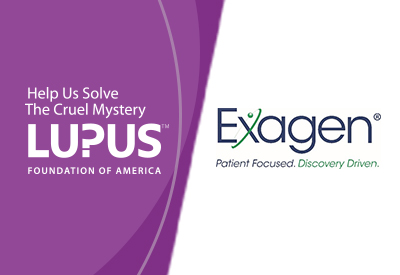Exagen and the Lupus Foundation of America Partner on New Initiative to Reduce the Time to an Accurate Lupus Diagnosis
Exagen, a life science company serving the rheumatology specialty, and the Lupus Foundation of America, the national force devoted to solving the mystery of lupus, announced a new initiative to educate those at risk for lupus about the disease and its symptoms in an effort to reduce the time it can take for an accurate lupus diagnosis. New tools and resources will be shared in English and Spanish through physician offices, websites, and social media. A delayed diagnosis contributes to poorer outcomes as lupus continues to damage the body's organs without proper treatment. This new initiative offers important information about the diagnosis process, including the role of advanced lab tests.

Lupus, which is two to three times more prevalent among women of color than among Caucasian women, is an unpredictable and misunderstood disease that ravages different parts of the body. It is difficult to diagnose, hard to live with, a challenge to treat, and can be fatal. Lupus is known for being difficult to diagnose because its symptoms are different from person to person, mimic the symptoms of many other diseases, and can come and go. A Lupus Foundation of America survey found that on average, it takes nearly six years for people with lupus to be diagnosed, from the time they first notice their lupus symptoms, and this initiative seeks to reduce that delay.
The timely diagnosis of lupus depends on several factors including current symptoms, medical history, findings from medical exams, and results from key laboratory blood tests. The need for improved lab tests prompted the Lupus Foundation of America to support early research on the development of Cell-Bound Complement Activation Products or CB-CAPs. CB-CAPs are now the cornerstone of the AVISE CTD test for diagnosis and AVISE SLE Monitor which is used to uncover disease activity in people who have lupus. Multiple publications on the use of this technology have demonstrated improvements over traditional lab tests alone such as ANA, C3/C4, or anti-dsDNA. Increasing awareness about these technological advances will ideally increase their use, contribute to reduced time to early and accurate lupus diagnosis, and improve disease management in people living with lupus.
“The Lupus Foundation of America is pleased to partner with Exagen on this important initiative,” says Stevan W. Gibson, president and CEO of the Lupus Foundation of America. “Shortening the time to an accurate diagnosis is one of the Lupus Foundation of America’s strategic priorities. Getting an early diagnosis of lupus is critical to preventing long-term consequences of the disease.”
Ron Rocca, President and CEO of Exagen shared, “Through the combined efforts of Exagen’s R&D team, the Lupus Foundation of America and lupus key opinion leaders, we are making every effort to advance the approaches to diagnosis, prognosis and monitoring of people with lupus. Together we are patient-focused and discovery-driven.”
Learn more about diagnosing lupus here.
About Exagen’s AVISE laboratory tests
AVISE Connective Tissue Disease (CTD) is a diagnostic test which supports care providers with an accurate assessment of critical biomarkers in patients suspected of systemic lupus erythematosus (SLE) or rheumatic conditions with similar symptoms. AVISE CTD uniquely incorporates biologically-relevant CB-CAPs (Cell-Bound Complement Activation Products) into a proprietary algorithm that is associated with the likelihood for the presence of SLE. This amounts to a convenient test for the differential diagnosis of SLE with demonstrated performance of 80% sensitivity and 86% specificity.
- CB-CAPs provide 22% higher sensitivity for SLE compared to standard complement measures C3 or C4 alone
- The AVISE CTD test offers 48% greater sensitivity than traditional anti-dsDNA alone
- Utilization of AVISE CTD has the potential to increase the timeliness and accuracy of SLE diagnosis
AVISE SLE Monitor is a unique combination of six biomarkers that provides important data to assist physicians anytime they assess the condition of a patient with SLE. This test employs proprietary assays including erythrocyte-bound C4d (EC4d) and platelet-bound C4d (PC4d) along with other key markers which have demonstrated significant correlation to SLE disease activity. AVISE SLE Monitor gives the treating care provider an accurate glimpse into the serologic measures of disease activity allowing for a more complete picture of how well a patient’s condition is being managed.
About Cell-Bound Complement Activation Products (CB-CAPs)
CB-CAPs (EC4d, BC4d, & PC4d) are stable biomarkers of complement activation. Exagen measures deposits resulting from activation of the complement system using flow cytometry to quantify C4d which is covalently bound to circulating cells including erythrocytes, B cells, and platelets.



